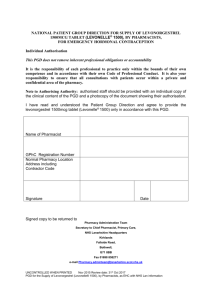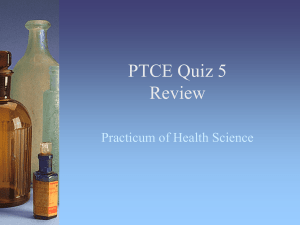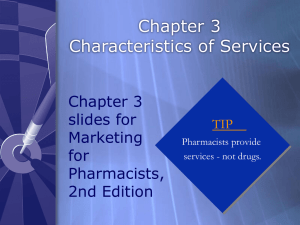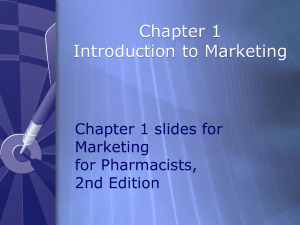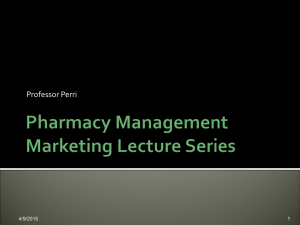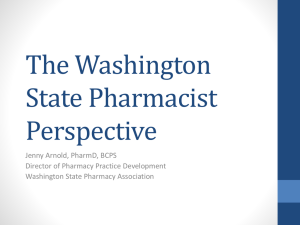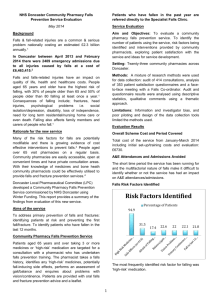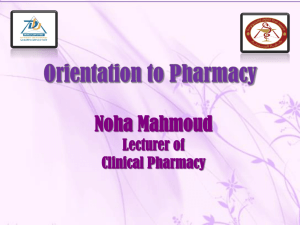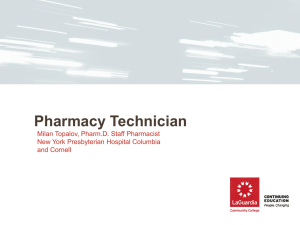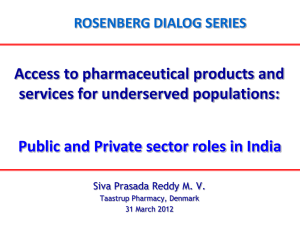EPiC Pharmacy processes August 12th 2014
advertisement
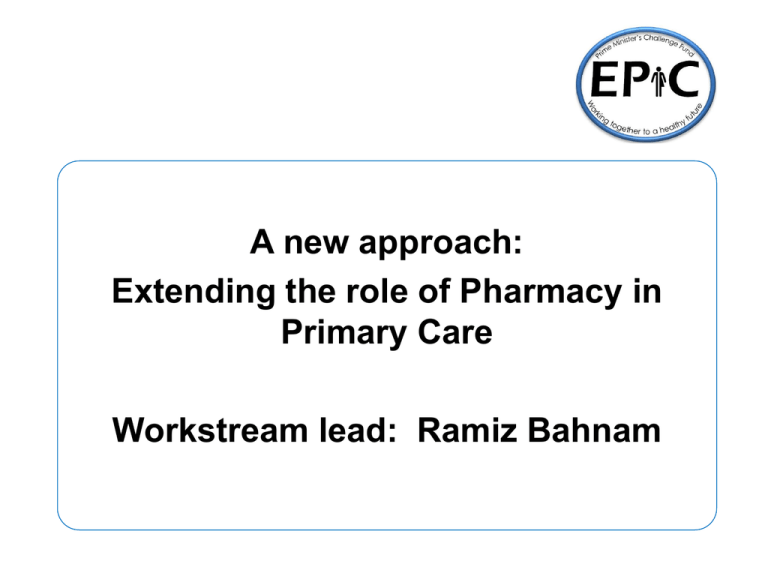
A new approach: Extending the role of Pharmacy in Primary Care Workstream lead: Ramiz Bahnam Contents • • • • • • • • • Vision of the service Scope Service model Care pathways IMT solutions Metrics Governance and assurance Training Outstanding issues Vision of the service Pharmacists will have a key role to play supporting general practice to manage the routine, non urgent case mix and those people who struggle to access primary care in working hours. Pharmacists will offer an enhanced service underpinned by access to the patient’s medical record, PGDs, training and a robust clinical governance framework. There will be more opportunities for people to access this enhanced service. Ultimately by redirecting a proportion of routine case mix to Pharmacists it will contribute to increased capacity within general practice to see more complex or frail patients. Vision for Pharmacy • Incorporate Pharmacy as part of the first line primary care team • Provide appointments for patients in a familiar and accessible environment • Use Pharmacists to their full potential, upskilling and supporting them to work in an extended role • Work with Pharmacists to optimise use of medicines in the city and reduce medicine waste Scope In scope: • Extended Pharmacy primary care service (requires clear definition); • Extended service will include minor ailments/illnesses underpinned by PGDs and all repeat prescriptions documented within the medical record. • Access to the extended Pharmacy service will be via: • GP triage (non urgent) • NHS 111 or IC24 • Clear pathways for on going clinical areas. Out of scope: • Existing Pharmacy services; • Patient does not meet referral criteria. 3 Levels of Service EPiC Pharmacies Level 1 Access to medical records. Pharmacist trained to use them and answer medication queries Level 2 Trained Pharmacist working with PGD’s. 3-4 trained Pharmacist per module Level 3 Independent Prescriber provides clinical consultations Care pathways People Receptionist Training and support Admin GP Triage and Booking EPiC Pharmacist Self care Management and discharge Access to medical records Refer to GP Primary Care Modules Participating GP Surgeries have been divided into 4 Primary Care Modules Modules 1 and 2 are Fast Starters Modules 3 and 4 are Early Adopters Each Module will have several Pharmacies linked to them, based on geography and the fact that they already provide services to those Practices Primary Care Modules IMT solutions IM&T requirements for Pharmacies are: • Access to a booking system with appointments made in real time; • Access to the full patient record to support clinical decision making • Two way feedback mechanism between GP and Pharmacist to be put in place. Progress to date: • All Pharmacies have N3 and SMART cards. • Pilot to Load System1 onto a Pharmacy system was successful but connectivity centrally was not achieved probably because of firewall issues. • Ongoing challenges with EMIS, especially in relation to a two way interaction between the GP and the Pharmacy system. Metrics Process outcomes: • Service take up: No. people seen within Pharmacy service vs available slots • No. people seen with service and discharged to self care or with management • No. people referred back to GP Person experience outcomes: • Patient experience/satisfaction surveys • GP/Nurse practitioner/Pharmacist experience surveys Service effectiveness outcomes: • Audit trail and tracking of PGDs • Compliments and complaints • Near miss and clinical incident reporting Governance and assurance General: • All PGDs developed within local prescribing guidelines • On going consultation with stakeholders including LPC, CCG etc. Clinical • Use of current national guidelines and evidence base to inform development of the PGDs • PGD sign off via EPiC clinical lead and project board • Each pharmacist will sign each individual PGD accepting responsibility for adherence to the PGD and that that they are clinically competent to deliver care in line with the PGD • Triaging GP to ensure that referral meets inclusion criteria for Pharmacy. IM&T: • Key issue around Pharmacist access to the medical record. Triaging GP will gain consent at point of onward referral and again at patient appointment. Training Pharmacy training plan needs to be developed for Fast Starters to include: • IM&T: • Booking system, • Accessing the medical record, • EPiC metrics • Clinical: • PGDs • PGD tracking system • Relationship building with GPs • Learning from first wave will then inform on going training needs for the Fast Starters as well as the Early Adopters. DBS Checks It is essential that all Pharmacists accessing patient records hold an up to date DBS. All Pharmacists will be asked to provide relevant details.
